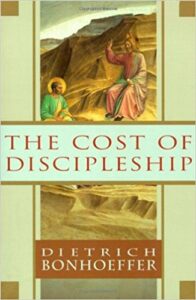Grace by David Watson

Christians in the Wesleyan tradition love to talk about grace, and with good reason. God’s grace is another way of talking about God’s love, love that can overcome anything, including the many ways in which we humans rebel against our creator. Paul writes to the church in Ephesus, “God, who is rich in mercy, out of the great love with which he loved us even when we were dead through our trespasses, made us alive together with Christ.” And then to underscore the point that this is God’s doing, and not our own, he interjects, “By grace you have been saved!” (2:4-5). In case it wasn’t clear enough the first time, he repeats it again just a few verses later: “For by grace you have been saved through faith, and this is not your own doing; it is the gift of God — not the result of works, so that no one may boast” (2:8-9).
When we speak of God’s grace, we mean an undeserved gift. In a world where we so often hear that people “get what they deserve,” our faith tells us that God gives us exactly what we do not deserve.” In fact, God offers us something much better than we deserve. In the Parable of the Workers in the Vineyard (Matthew 20:1-16), Jesus teaches us that the kingdom of heaven is like a place where we receive not on the basis of our efforts, but on the basis of God’s generosity, and our God is indeed generous.
We cannot earn God’s love. Rather, God simply loves us. As we read in Psalm 103:8-10,
The Lord is merciful and gracious,
slow to anger and abounding in steadfast love.
He will not always accuse,
nor will he keep his anger forever.
He does not deal with us according to our sins,
nor repay us according to our iniquities.
 The clearest sign of God’s love and grace is the gift of his Son Jesus Christ. Christ humbled himself and became human (Phil 2:5-11), a person with flesh, blood, and emotions, like any of us. He went to the cross as a sacrifice for our sins. He truly suffered and truly died so that broken people like us could have new life. In The Cost of Discipleship, Dietrich Bonhoeffer calls this “costly grace.” Costly indeed: the Holy One of God, the beloved Son of the Father, who was without sin, gave himself up to suffering and death for our salvation. In Romans Paul observes, “Rarely will anyone die for a righteous person — though perhaps for a good person someone might actually dare to die. But God proves his love for us in that while we still were sinners Christ died for us” (Rom 5:7-8).
The clearest sign of God’s love and grace is the gift of his Son Jesus Christ. Christ humbled himself and became human (Phil 2:5-11), a person with flesh, blood, and emotions, like any of us. He went to the cross as a sacrifice for our sins. He truly suffered and truly died so that broken people like us could have new life. In The Cost of Discipleship, Dietrich Bonhoeffer calls this “costly grace.” Costly indeed: the Holy One of God, the beloved Son of the Father, who was without sin, gave himself up to suffering and death for our salvation. In Romans Paul observes, “Rarely will anyone die for a righteous person — though perhaps for a good person someone might actually dare to die. But God proves his love for us in that while we still were sinners Christ died for us” (Rom 5:7-8).
The theme of God’s grace shows up regularly in Wesley’s sermons. Grace, for Wesley, was a way of talking about all the work God does in our lives to lead us more deeply into salvation. Wesley sometimes spoke of preventing (or prevenient) grace. The term “preventing” here meant something different in Wesley’s day than it does in ours. In Wesley’s sermons, it means that God’s grace comes to us before we ever have the slightest inkling that we need God. The Holy Spirit creates in us “the first wish to please God, the first dawn of light concerning his will, and the first slight, transient conviction of having sinned against him” (“On Working Out Our Own Salvation,” II.i). In other words, preventing grace creates in us the first awareness that something is not right in our lives, and that only God can truly make things right.
We can, of course, entirely reject these inclinations. We can push them aside, chalk them up to sentimentality or heartburn, and go on our way. Wesley was well aware that many people do just that. Alternatively, however, if we allow these feelings to grow in our hearts, if we begin to take seriously the desire for repentance that God creates within us, we will begin to feel a deep conviction of sin. Wesley calls this convincing grace, or, simply, repentance, “which brings a larger measure of self-knowledge, and a farther deliverance from the heart of stone” (“On Working Out Our Own Salvation,” II.i.). Why do we think of repentance as a form of grace? Remember that, without God’s help, we could never repent to start with, and without repentance, we cannot be saved from sin and death.
With repentance, however, comes a deep desire to be freed from both the guilt and the power of sin. This is where justifying and sanctifying grace come in. Every one of us has acted many times in ways that are out of sync with God’s will. That’s simply part of the human condition. Or, to put it another way, our sins create a chasm between God and us. Jesus, on the cross, has bridged that chasm. He has atoned for our sins. Think of atonement as at-one-ment. In his death on the cross, Jesus has made it possible for us to return to a right relationship with God. Jesus didn’t have to do this. He did it out of love for us. It is a gift. It is grace. It is, in fact, justifying grace – the gift of God’s forgiveness of our sins.
God doesn’t just free us from the guilt of sin, however. God frees us from the power of sin as well. From that first moment when we begin to feel God drawing us into a closer relationship with him, the Holy Spirit is at work in our hearts. God begins to change us from the inside out. Our desires begin to change. The way we see the world changes. We begin to hope for different things. We begin to react to adversity differently than we would have before. We begin to regard other people in a new way–even the ones who are hard to like. This is God’s gift to us. It is the gift of sanctifying grace. “Sanctification” is just another way of saying that God is making us holier people, and that is just another way of saying that God is making us into the people we were always meant to be.
The grace of God in our lives changes us, and in turn we extend grace to others. When someone is unkind to us, we can extend him or her grace. We can forgive those who have hurt us. We can give without thought of what we might receive in return. We can even love our enemies. Whether or not the recipients of our grace deserve it or not is beside the point. God gave to us simply out of love, and God requires and empowers us to do the same to others. God’s grace is so abundant that it flows out of our lives and into the lives of other people. As Wesley put it, “God works; therefore you can work. Secondly, God works; therefore you must work” (“On Working Out Our Own Salvation,” III.3).
There is real beauty in the work of God – glorious, simple, earth-shaking beauty. That beauty is expressed more perfectly in poetry than prose, as Charles Wesley so aptly demonstrates in his hymn, “Father of Everlasting Grace”:
Send us the Spirit of Thy Son,
To make the depths of Godhead known,
To make us share the life divine;
Send Him the sprinkled blood to apply,
Send Him our souls to sanctify,
And show and seal us ever Thine.
Freely we have received, and so freely let us give. May God make it so in our lives.
Featured image is “Grace Lake,” painted by Canadian artist Franklin Carmichael in 1934.